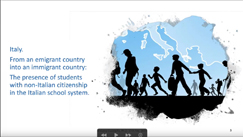5. Islam in Italy: an intercultural/interreligious and citizenship challenge
Prof. Paolo Luigi Branca, Catholic University, Milan, Italy
This webinar "Islam in Italy: an intercultural/interreligious and citizenship challenge" offers participants to hear about grassroots interfaith and intercultural initiatives from Italy. Speakers at the webinar were: Baraza associate Prof. Paolo Luigi Branca - Born in Milan, Prof. Branca is Associate Professor of Arabic and Islamic Studies at the Catholic University of Milan. He focused his studies on Islam and Modernity and has written very many publications to this effect.
The speakers were:
Prof. Antonio Cuciniello - He is an Arabist and Islamologist. He holds a PhD in Humanities, Tradition and Modernity (Religious Sciences) from the Catholic University of Milan, where he is a professor of Arabic culture and literature as well as a Research Fellow in the History of Islamic countries. After graduating in 2000 from the University of Naples – “L’Orientale”, in 2001 he obtained a Diploma in Arabic Studies and in 2002 a Licentiate in Arabic and Islamic Studies at the Pontifical Institute for Arabic and Islamic Studies (PISAI) of Rome. He then lived in Cairo, Egypt for three years. He was part of the Scientific Committee of the Group for Islam of the Office for Ecumenism and Interreligious Dialogue of the Italian Episcopal Conference (CEI). He has considerable expertise in interreligious and intercultural relations, as well as with research and publications in the academic field.
Prof. Francesca Bocca-Aldaqre - PhD (2015) Ludwig-Maximilians-Universität (Munich), she is Professor for Arabic Language and Culture at the Società Umanitaria in Milan, and Professor for Islamic Theology at the Italian Institute for Islamic Studies. She writes about the relationship between Islam and European (especially German) culture. She is also interested in the issue of Islam and education; she is director of the Averroè Institute, teaching Arabic language and religion to around 300 children a year.
Imane Barmaki - Imane says, “My last name is Persian, my first name is Arabic. Geographically I am Moroccan, culturally I am Italian and historically I am francophone. A kaleidoscope of identities that sometimes mesh smoothly and some other times tend to clash”. That's how Imane likes to describe herself to emphasize the complexity of her cultural background. Imane was born in Morocco and moved to Italy when she was 13 years old. As a socially-committed second-generation immigrant, she has always been passionate about fighting religious stereotypes and misconceptions and has therefore devoted much time and effort in helping to promote dialogue and mutual understanding among people of different faiths through concrete actions.
